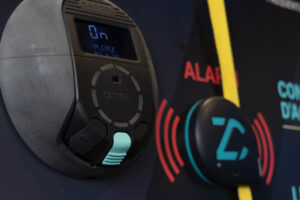
SEASLAG: A new biomaterial to regenerate marine ecosystems based on byproducts of the steel and agrifood industries
September 19, 2023
Energy information in digital administration: design of a model of Building Renovation Passport based on BIM and Blockchain
October 11, 202329/09/2023
The specific research centre Intelligent Data Science and Artificial Intelligence (IDEAl) at the UPC and the International Centre for Numerical Methods in Engineering (CIMNE) are taking part in the creation of a virtual assistant focused on informing and helping citizens to process social grants via the mobile phone. Gavá and Mataró town councils will be the first to make this service available to their population.
The ‘Gavius’ project, which is led by Gavá Town Council, is focused on developing a virtual assistant to inform citizens about financial aid and social grants that they may be eligible for, and to automate the process of applying for and receiving them. Through a mobile application that is accessible via smartphones, touch screens and digital display totems distributed throughout the city, and through the use of artificial intelligence, citizens can find out about grants, apply for them and manage them in a convenient, fast and simple way.
Users of the application identify themselves using their biometric data and can obtain information, apply for and manage grants on the spot. To be able to automate processes with this tool, an artificial intelligence system, which learns constantly from the various types of use, identifies potential target users. In this way, ‘Gàvius’ enables digital identification through facial or biometric recognition, while maintaining the privacy of the user and easy usability.
At the same time, an assistant has been designed for those who work in social services and citizens services, so that they can inform users of the grants that are available to them, depending on each person’s situation, and proceed with the payment automatically.
The new virtual assistant is designed to be implemented in many other use cases, to improve the current relationship between citizens and government bodies. In this way, a shift can be brought about from a reactive government to a proactive government, which offers services in a more personalised, approachable way, and determines citizens’ needs through the use of data.
Smart government at the service of the citizens
‘Gavius’ is designed to create a smarter, more modern and accessible government that is adapted to the digital transformation and always focused on citizens. In the framework of the project, the proposal is to create a tool that provides solutions at different levels:
- Citizens: simplify and improve bureaucratic procedures with the city council.
- Government teams: help in decision-making, based on the interpretation of data.
- Municipal teams: improve productivity, speed and efficacy in the management of citizens’ procedures.
- Other government bodies: test a model based on automatic learning (machine learning) and artificial intelligence for the modernisation of the public sector.
Participants in the project include Intelligent Data Science and Artificial Intelligence (IDEAl) at the Universitat Politècnica de Catalunya - BarcelonaTech (UPC) and the Centre for Numerical Methods in Engineering (CIMNE), a research centre that is the result of a consortium between the Government of Catalonia and the UPC.
IDEAI is leading the work package to design and implement the data management of the system and the predictive models to help citizens. Its work is focused on the algorithmic development of decision support systems, the ethical analysis of the entire system and the training of technicians to use the system. CIMNE provides the project with the identification and gathering of relevant information from the available data sources, to use it for the models that will be developed. In this way, it will provide the data extraction and transformation. In addition, it will help in the development of the interaction interface between citizens and city council services.
Budget and funding
The project has European funding from the Urban Innovative Actions (UIA) programme. Other participants are the XNet platform, Admnistració Oberta de Catalunya (AOC), GFI and Ernst & Young. The project’s pilot tests have been carried out in Gavá and Mataró since the last quarter of 2021 and their implementation is planned for the end of 2023.

Image: Gavius project.
Image: Gavius project.
Related Projects
- The Visualisation, Virtual Reality and Graphic Interaction Research Group (ViRVIG) at the Universitat Politècnica de Catalunya - BarcelonaTech (UPC) has participated in the XR4ED project, an initiative that connects the educational technology (EdTech) and Extended Reality (XR) sectors, with the aim of transforming learning and training across Europe.
- The inLab FIB at the UPC has collaborated with Lizcore® for the development of a proof of concept based on artificial intelligence to improve safety in climbing with autobelay devices. The system allows the automatic and accurate detection of risk situations before starting a route.
- Researchers from the Centre for Image and Multimedia Technology of the UPC (CITM) and from the DiCode research group (Digital Culture and Creative Technologies Research Group) of the Universitat Politècnica de Catalunya – BarcelonaTech (UPC) have worked on the project The Eyes of History, an initiative of the Catalan Agency for Cultural Heritage that offers an immersive view of Catalan cultural heritage. It is especially aimed at the first and second cycles of secondary education and was created to bring heritage into the classroom. Its goal is to bring the history and monuments of Catalonia closer in a vivid and innovative way, using tools such as virtual reality and new museographic narratives.
- City and Play is a social action project coordinated by researchers from the Centre for Image and Multimedia Technology (CITM) and the DiCode research group (Digital Culture and Creative Technologies Research Group) of the Universitat Politècnica de Catalunya – BarcelonaTech (UPC), the Universitat Oberta de Catalunya (UOC) and the University of Barcelona (UB), and funded by Barcelona City Council. The aim of the project is to promote civic competences and reflection on the urban environment among adolescents through the creation of an open framework that uses methodologies based on play, co-creation and storytelling.





